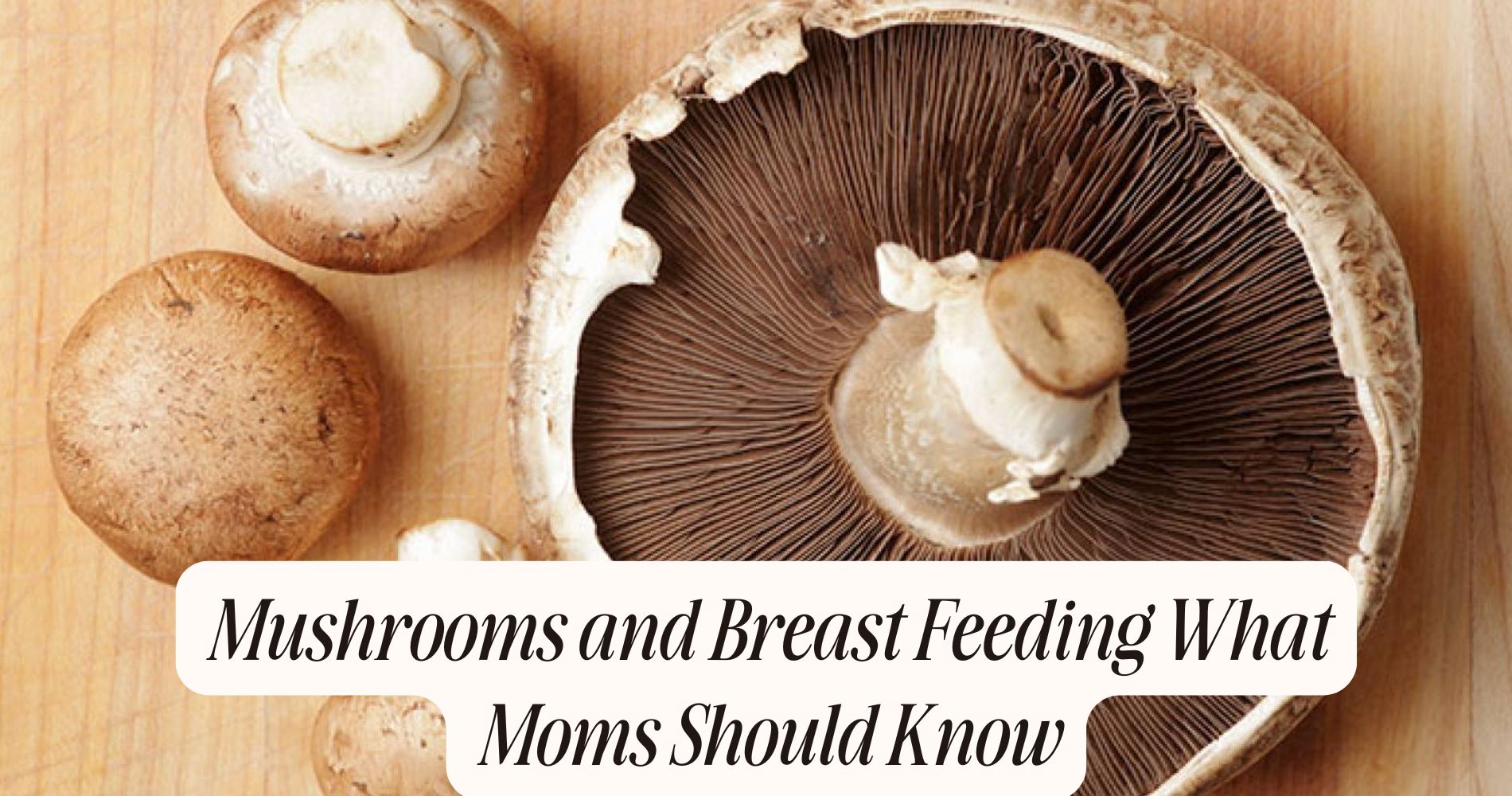
Mushrooms and Breast Feeding What Moms Should Know
When it comes to mushrooms and breast feeding, safety and nutrition are top priorities. Many edible mushrooms offer valuable nutrients like B vitamins, selenium, and antioxidants that can support your energy levels and overall health during lactation. However, it’s essential to select the right types, cook them thoroughly, and watch for potential allergens that could affect your baby. Curious about which mushrooms are safest and most beneficial for nursing moms? Let’s break down what you need to know to enjoy them with confidence.
Nutritional Benefits of Mushrooms for Breastfeeding Moms
When you're breastfeeding, it’s essential to fuel your body with nutrient-rich foods, and mushrooms offer a variety of health benefits that can support both you and your baby.
Mushrooms are renowned for their nutrient density, providing essential vitamins and minerals like B vitamins, selenium, and copper, which are crucial for your energy and overall health. These nutrients also help in producing high-quality breast milk.

Additionally, mushrooms contain compounds that boost immune support, helping you ward off infections during this significant time.
By including mushrooms in your diet, you not only enhance your nutritional intake but also promote your baby's development through the nutrients transferred in your milk.
Embrace mushrooms as a delicious and versatile addition to your breastfeeding diet.
Safe Mushroom Varieties to Include in Your Diet
While managing your diet as a breastfeeding mom, it’s essential to know which mushroom varieties are safe and beneficial. Shiitake mushrooms are a great choice; they’re packed with protein, vitamins, and minerals that support both your health and your baby's development.
The shiitake benefits include boosting your immune system and providing essential amino acids. Oyster varieties, like blue and pearl, are also safe options. They’re rich in antioxidants and can help reduce inflammation, making them a smart addition to your meals.
Incorporating these mushrooms into your diet can enhance flavor and nutritional value. Just verify they’re properly cooked to maximize their benefits and minimize any potential risks. Enjoy experimenting with these delicious varieties!
Potential Allergens and Sensitivities to Consider
Understanding potential allergens and sensitivities is essential for breastfeeding moms considering mushrooms in their diet. While mushrooms are nutritious, they can trigger mushroom allergies in some individuals.
If you're introducing mushrooms, start with small amounts and monitor both your reactions and your baby's reactions. Pay attention to signs of allergy, such as rashes, gastrointestinal distress, or unusual fussiness in your baby.

Some mushrooms, like shiitake or portobello, may be more likely to cause sensitivities. Also, be aware that certain mushrooms can cause gastrointestinal discomfort, affecting your milk supply and your baby's comfort.
How Mushrooms May Affect Milk Supply
Mushrooms can play a role in your milk supply, and their effects may vary depending on the type you consume. Certain mushroom types, like shiitake and maitake, are rich in nutrients and may support overall health, potentially enhancing milk production.
They contain vital vitamins and minerals that can help nourish your body during breastfeeding. However, some mushrooms, like the more exotic varieties, mightn't have well-studied effects on lactation, so it’s important to approach them with caution.
Always consult your healthcare provider before introducing new foods to your diet. Balancing your intake with a variety of nutrient-dense foods will help you maintain an adequate milk supply while enjoying the benefits mushrooms can offer.
Cooking and Preparation Tips for Mushrooms
When preparing mushrooms for your meals, it’s essential to clean them properly to remove any dirt or grit. Use a damp cloth or a soft brush for delicate varieties.
For storage, keep mushrooms in a paper bag in the fridge; this helps maintain their freshness while preventing moisture buildup.

When it comes to cooking, mastering sautéing techniques can enhance their flavor. Heat a tablespoon of oil in a pan over medium heat, then add sliced mushrooms in a single layer.
Avoid overcrowding the pan, as this can cause steaming rather than sautéing. Stir occasionally until they’re golden brown.
Signs of Mushroom Sensitivity in Babies
Although many parents introduce a variety of foods to their babies, it’s essential to watch for signs of sensitivity when mushrooms are on the menu.
Mushroom reactions can vary, and noticing baby symptoms early can help you respond appropriately. Common signs include rashes, gastrointestinal distress, or unusual fussiness after eating. If your baby develops hives, diarrhea, or vomiting shortly after consuming mushrooms, these may indicate a sensitivity.

Additionally, keep an eye out for any respiratory issues, such as wheezing or difficulty breathing, which may also suggest a more serious reaction.
If you observe any of these symptoms, it’s vital to monitor your baby closely and consider eliminating mushrooms from their diet until you consult with a healthcare professional.
Consulting With Healthcare Professionals About Diet Choices
If you've noticed any signs of mushroom sensitivity in your baby, it’s important to consult with a healthcare professional about dietary choices.
A dietary consultation can provide you with essential insights tailored to your specific needs as a breastfeeding mother. Healthcare guidance is vital, especially when it comes to identifying potential allergens like mushrooms in your diet.
Your healthcare provider can help you evaluate your baby's response to various foods, ensuring you're making informed decisions. They may recommend eliminating certain foods or suggest alternatives that are safe for you and your baby.
Gentle Wellness for Moms on the Go
If you’re navigating the demands of motherhood and looking for a simple way to support your energy, focus, and immunity—without adding extra stress—Well Gummies has you covered. Our SUPER MUSHROOM GUMMIES are thoughtfully formulated with 10 functional mushrooms in a delicious, chewable format that’s as convenient as it is powerful. Whether you're chasing toddlers or nursing a newborn, these vegan, wild-berry flavored gummies offer calm, sustained energy with no jitters or crash. Nourish your body and mind naturally—because moms deserve wellness that fits into their busy lives.
Frequently Asked Questions
Can Mushrooms Cause Digestive Issues in Breastfeeding Moms?
Certain mushroom varieties can cause digestive issues for some individuals. If you notice discomfort, it’s wise to monitor your intake. Prioritizing your digestive health guarantees both you and your baby remain healthy while breastfeeding.
How Do I Introduce Mushrooms to My Diet While Breastfeeding?
To introduce mushrooms, start with mild varieties like cremini or button. Sauté them in olive oil or add to soups. Monitor your body’s response and your baby's, gradually increasing the amount you consume.
Are There Any Cultural Beliefs About Mushrooms and Breastfeeding?
You’ll find diverse cultural beliefs surrounding mushrooms and breastfeeding. Some traditions incorporate mushroom folklore, viewing them as nourishing, while others express caution, emphasizing potential risks. Understanding these perspectives can help guide your dietary choices during breastfeeding.
Can Mushrooms Interact With Breastfeeding Medications?
Mushrooms can potentially interact with certain medications. It’s essential you check mushroom safety against breastfeeding guidelines to guarantee both your health and your baby’s. Consulting a healthcare professional is always a wise choice in these situations.
What Are the Signs of Mushroom Intolerance in Breastfeeding Moms?
If you’re experiencing mushroom allergies, watch for symptoms like rash, stomach upset, or respiratory issues. These breastfeeding reactions can impact both you and your baby, so consult a healthcare professional if you notice any signs.
Conclusion
Incorporating mushrooms into your diet while breastfeeding can offer valuable nutrients and support your health. Stick to safe varieties like shiitake and oyster, and introduce them gradually to watch for any potential sensitivities. Cooking mushrooms properly enhances their benefits and safety for both you and your baby. Always consult with your healthcare provider about your dietary choices to guarantee they align with your individual needs and to address any concerns regarding allergies or milk supply.




